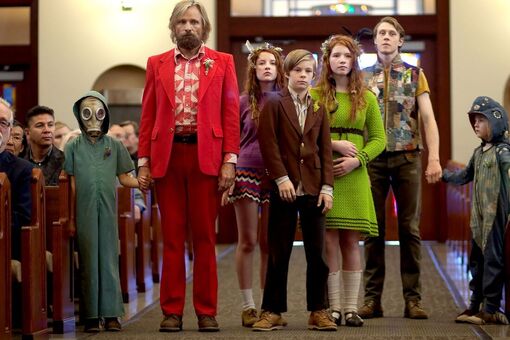B+ | An off-the-grid family reenters society after a tragedy. Directed by Matt Ross Starring Viggo Mortenson, George MacKay, and Frank Langella Review by Jon Kissel |

Cash, played by Viggo Mortensen in his best role since The Road, is raising his six children by himself in the forests of Washington state. Ranging in age from 6 to 18 and evenly split between boys and girls, days are spent on adventure amongst the trees and mountains while evenings are devoted to Nabokov and Sartre, with the occasional jam session included, because of course each child also plays an instrument. The kids argue about who's a Trotskyite and who's a Maoist, with debate about the finer points of difference between these ideological subfactions. Despite the one-room-schoolhouse approach, there is a recognizable passage from one level to the next, with oldest Bodevan (George MacKay) hunting deer at knife point while youngest Nai (Charlie Shotwell) gets to occasionally piggyback through the brush on dad's back. There are boundaries, but far further away than most parents would allow. It's a happy and fascinating family that refuses to compromise their goals of tutelage, described by Ben and his unseen wife as a method to raise 'philosopher kings.'
The wife, in a hospital at the beginning of the film, dies shortly after the Cash family has been introduced, prompting the distraught survivors to return to civilization for her funeral. The fish out of water aspect here isn't as groundbreaking as the pedagogical aspect, but it remains charming. Nai wonders why there are so many sick people walking around, when they're actually just obese. Bodevan, or Bo, is clueless around girls his age, asking marriage of one at a campsite despite knowing each other for a few hours. Like all children, they don't understand why other people don't live like them, remaining uncharmed by their cousins' fighting games and baffled by their ignorance about the Bill of Rights. The real conflict comes when in-law's Jack and Abigail (Frank Langella and Ann Dowd) are introduced, both of whom are deeply conflicted, if not hostile towards their grandchildren's upbringing. They peel off adolescent rebel Reillian (Nicholas Hamilton) to their way of thinking, potentially splitting the Cash's even further.
Captain Fantastic could have gone so terribly wrong, as this is essentially about a whole brood of insufferables who would gladly tell a family at Christmas that Jesus could not possibly have been born in December and that they're all fools for thinking so. Mortensen, the aforementioned sons, and daughters Kielyr, Vespyr, and Zaja (Samantha Isler, Annalise Basso, and Shree Crooks) absolutely do call out ignorance where they see it, but they are such a recognizable family unit that it's easy to root for them. Nai wants to be included, Zaja pipes in whenever she can, Reillian keeps to himself, Kielyr and Vespyr fight like sisters being raised in any milieu, and Bo sets the tone while Ben does his best to keep everyone rallied and focused. Roles are not fixed, but interchangeable when a previously morose kid is now having a good day. There's no mugging, such that it's easy to believe the kids' raw intelligence. On a thematic level, there's no noble savagery-type pandering. Both sides have their fatal flaw, with Ben too proud and the rest of society too satisfied with mediocrity. The sins committed against the Cash's also resonate strongly, as the centerpiece scene involves them interrupting their very atheist matriarch's very Christian funeral. Ross plays a fair game with the characters' depictions, only putting his hand on the scale when ensuring veracity and humanity.
For all its thought-provoking display of self-exiled geniuses, Captain Fantastic does trip up with a series of false endings, some more true to the proceedings than others. Bo gets the most screentime as the true believer about to leave the nest, and therefore factors heavily in these endings, but never clicks as well as Reillian or Zaja. Ross recovers with a joyous penultimate celebration and a beautiful tableau to finish, but there is a hint of sap from earlier, falser moments in a film loaded with what feels like truth. Captain Fantastic encourages its viewers to seek that truth out, or at least attempt to impart some of it to the next generation. Maybe give them a book above their age range, or seriously entertain their natural inquisitiveness with a rudimentary science experiment. Maybe read some long-form journalism instead of play another round of Angry Birds, or worse yet, watch the Angry Birds Movie. B+
 RSS Feed
RSS Feed